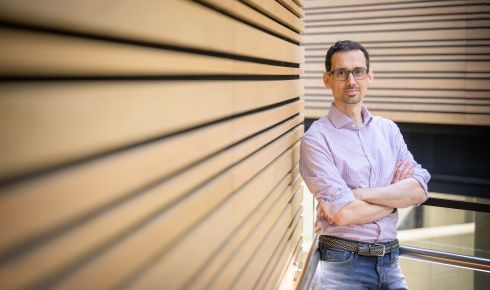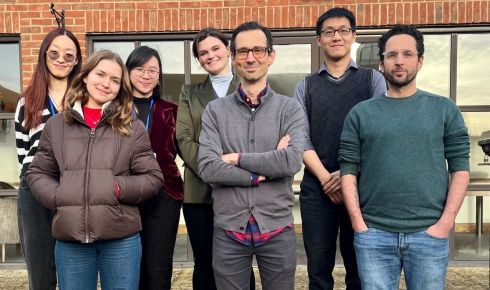My Lab Unlocked: Professor Benjamin Schuster-Böckler of the Ludwig Institute for Cancer Research

Professor Benjamin Schuster-Böckler FRSB on his work to understand the role of changing genomic patterns in the processes that drive cancer initiation
My group aims to understand the processes that drive cancer initiation by looking at changing genomic patterns during tumorigenesis. We do this by applying statistical and machine learning methods to large amounts of data from different sources and extracting novel insights from the often unexpected relationships between them. For example, we discovered that cancer mutations occur more often in regions that are epigenetically silenced. More recently, my lab was able to show that DNA replication makes more errors when copying epigenetically methylated DNA. These findings have a profound impact on how we think about the relationship between age, environmental exposures and cancer risk.
New technologies have made it possible to measure the mosaic landscape of somatic mutations in healthy cells. Surprisingly, many otherwise “normal” cells already harbour mutations that were thought to drive cancer. While it’s clear that such mutations are necessary for tumours to form, there is now an increasing debate to what extent they are sufficient to produce cancer. Other, epigenetic effects might play an equally crucial role. That is part of the reason why we are now very interested to better understand the changing epigenetic landscape in the run-up to cancer.
Nowadays, we increasingly collaborate with experimental groups to generate new data, in addition to leveraging publicly available resources. We are especially interested in the effects of environmental exposures on DNA stability. Our tools could help to understand the genomic impact of toxins. In this context, it would be great to collaborate with more people from the toxicology field who have been looking at related questions using different technologies for a long time.
In addition to basic science, a second focus of the lab is method development, such as the TAPS assay (TET-Assisted Pyridine-Borane sequencing) which allows the accurate detection of epigenetic DNA methylation at base-resolution from very small amounts of starting DNA. This work has led us into the field of cell-free DNA diagnostics, where we now try to leverage our understanding of the “genomic patterns of cancer” to develop sensitive tests for cancer early detection.
 Professor Schuster-Boeckler with members of his lab team
Professor Schuster-Boeckler with members of his lab team
Starting a lab was not my original plan A. After four years of PhD and three years of postdoc, I was a bit burnt out. I decided to quit science and join a software startup and leaving academia initially felt liberating. For me, it was an important realisation that there are other career paths that I could take. However, two years after joining the company, the founder decided to sell it to a large publishing company based in London. Now living in the UK, I realised that I was craving a new challenge. Working in a tech startup made me reflect on what it was about working in academia that I did and did not appreciate, and gave me a sense of choice: I could do other things, but actually I still had this deep sense of curiosity and an urge to do something that felt more “meaningful”.
My partner at the time pointed me to the advertisement for a junior PI position in Oxford – it was only a week until the application deadline. I didn’t believe I was able to put together a good application in time, but she convinced me to try anyway.
When, after three rounds of interviews, I did ultimately get the offer to join the Ludwig Institute, I was as shocked as I was elated – the task of setting up a group after a few years away from academia seemed equally exciting and daunting. The single biggest reason my lab “survived” this early phase is that my first PhD students were all exceptionally gifted and hard working. As such, I feel that arguably my proudest achievement is that two former postdocs and two former PhD students have now started their own labs. Nowadays, I feel strongly that giving junior scientists the space and the means to develop their own ideas is one of the most important aspects of my job.
During the early stages of my career, I was not very strategic in my decision making. I focussed more on the next scientific challenge, and followed my gut when it came to choosing where to go next. For example, after completing my PhD, I attended a conference in Barcelona to present some of my work. There, I met a young PI who had just set up his first lab at the Center for Genomic Regulation. He convinced me there and then to join his group as a postdoc. My PhD supervisor was concerned that I would forego the chance to get a “big paper” by moving to a more established lab, but I followed my instincts. In this case, the risk paid off: the paper that came out of my time working in this group paved the way for me getting an independent position five years later. I think this is an example of how unpredictable scientific careers can be. Often, progression can be down to luck and good timing. The one thing we can influence is to do our best and really commit to every new challenge. It’s not a guarantee, but opportunities often follow.
I am incredibly grateful to the head of my department, Prof Xin Lu, who gave me the chance to set up my lab in Oxford and has been incredibly supportive as it grew, and to the Ludwig Institute for Cancer Research, the MRC and CRUK for funding our work over the years.
Professor Benjamin Schuster-Böckler FRSB is head of the Computational Cancer Genomics Group at the Ludwig Institute for Cancer Research, Oxford


